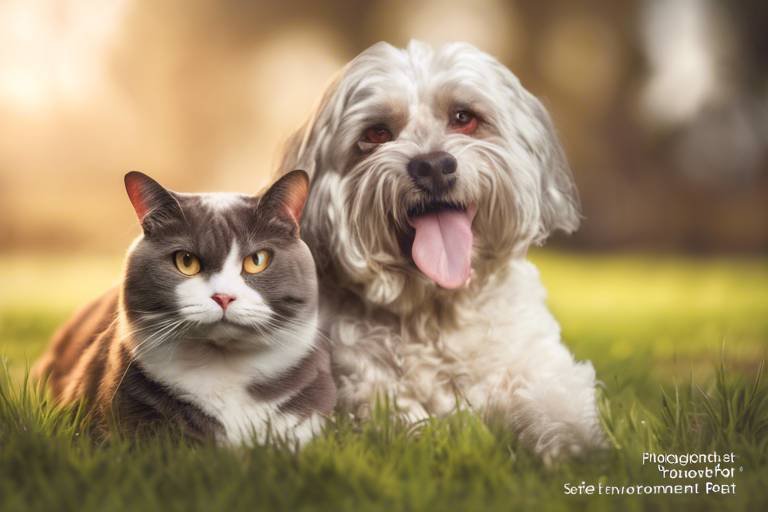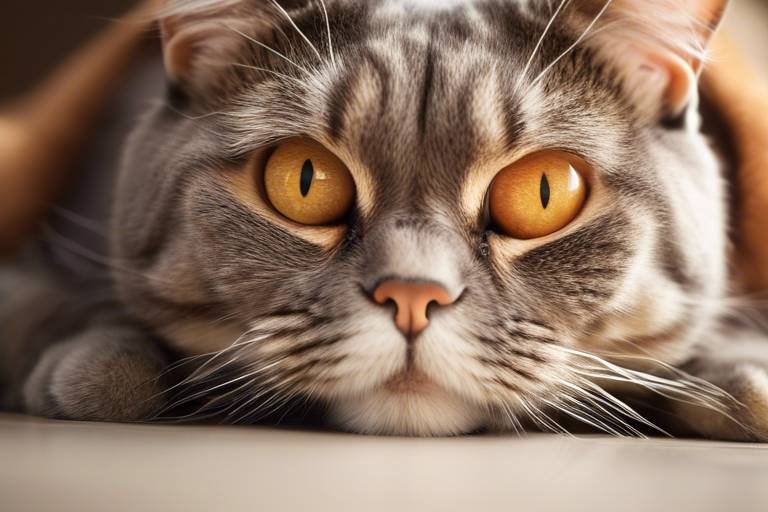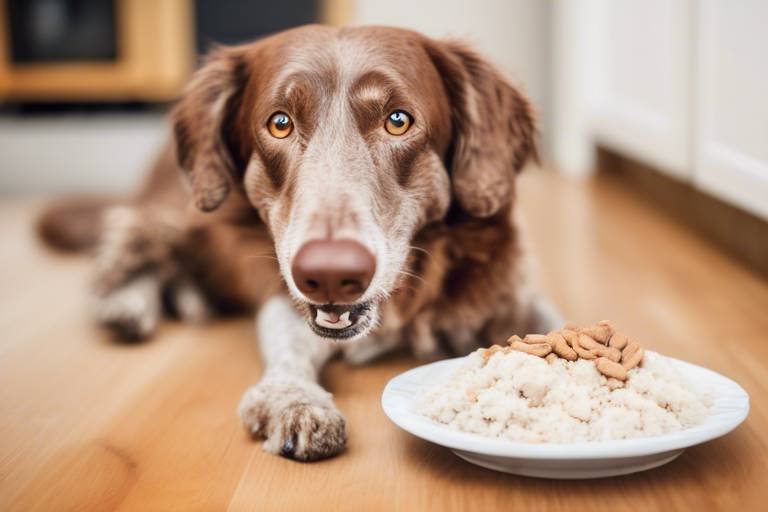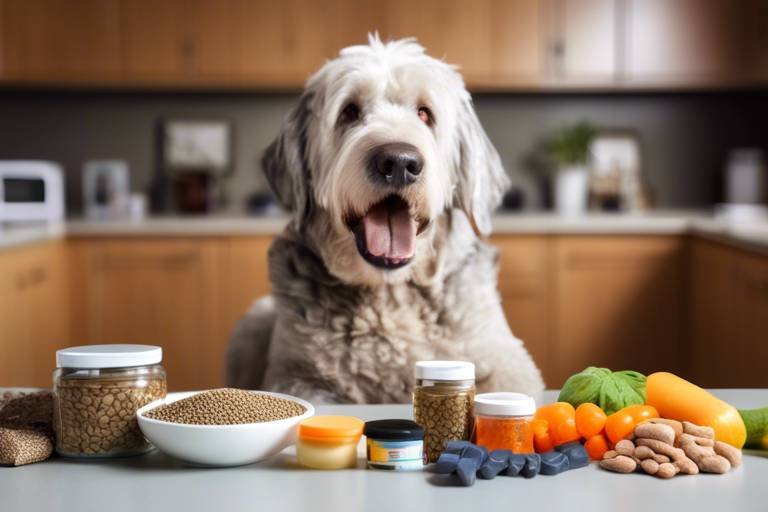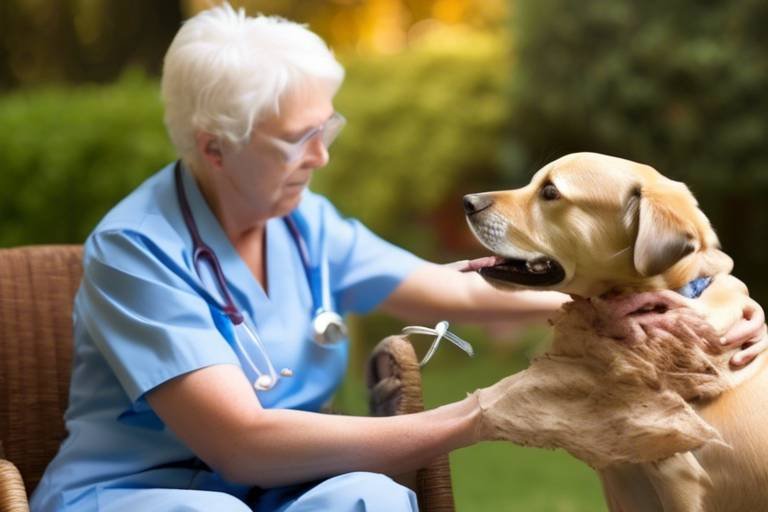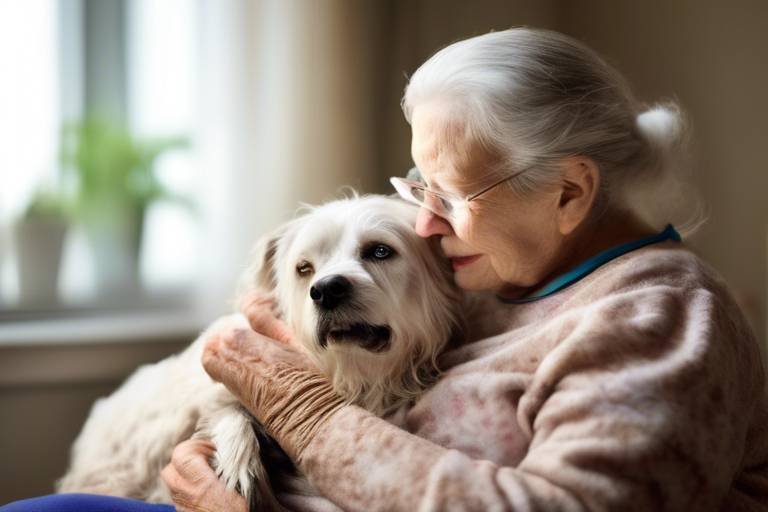How to Help Senior Pets with Memory Loss
As our beloved pets age, they may face a variety of challenges, one of which is memory loss. Just like humans, pets can experience cognitive decline, leading to confusion and anxiety. It’s heartbreaking to watch our furry friends struggle with their memories, but there are effective strategies to help them navigate this difficult phase of their lives. By understanding their needs and providing a supportive environment, we can significantly enhance their quality of life. Have you ever noticed your pet staring blankly at a wall or forgetting where their food bowl is? These moments can be distressing, but recognizing them is the first step toward providing the care they need.
Memory loss in senior pets often goes hand in hand with cognitive dysfunction syndrome (CDS), which can manifest in various ways. This condition can affect their daily routines, behavior, and overall happiness. Just like a once-vibrant library that has lost its organization, our pets may need help to find their way back to their joyful selves. The good news is that with a little patience and understanding, we can help them feel secure and loved.
So, how do we support our aging companions? It starts with recognizing the signs of memory loss and cognitive dysfunction. By being vigilant and attentive, we can create a nurturing environment that caters to their changing needs. This journey may require adjustments to their daily routines, but it can also deepen the bond we share with them. After all, every wag of their tail or purr of contentment is a reminder of the love we share.
Memory loss in senior pets can manifest in various ways. Understanding the signs of cognitive dysfunction is crucial for pet owners to provide appropriate care and support for their furry friends. Just as we might forget where we put our keys, pets can forget familiar places or routines. They may seem lost in their own homes, and this disorientation can be alarming. Recognizing these signs early allows us to take proactive steps to improve their comfort and well-being.
Recognizing the signs of cognitive dysfunction in pets is essential. Common symptoms include disorientation, changes in sleep patterns, and altered behavior, which can help owners identify when their pets may need assistance. For instance, if your pet starts pacing at night or seems to get confused about their surroundings, these could be indicators of memory loss. Keeping an eye out for these behaviors can help you intervene early and provide the necessary support.
Behavioral changes are often the first indicators of memory loss. Pets may exhibit increased anxiety, confusion, or changes in their interaction with family members, signaling the need for closer observation and care. Imagine how unsettling it would be to wake up in a place you don’t recognize; this is similar to what our pets might feel. Increased anxiety can lead to further distress, making it vital for us to create a calm and reassuring environment.
Senior pets may experience heightened anxiety due to memory loss. Understanding this can help owners create a calm environment, minimizing stress and promoting a sense of security for their pets. Simple actions like speaking softly, maintaining a routine, and providing gentle physical contact can make a world of difference. Think of it as wrapping them in a warm blanket of love and familiarity.
Disorientation is common in pets with memory loss. They may get lost in familiar surroundings, making it crucial for owners to provide a safe and structured environment to prevent accidents. Just as we might feel lost in a new city, our pets can feel similarly in their own homes. Keeping pathways clear and eliminating hazards can help them navigate their space with confidence.
Adjusting a pet's daily routine can significantly impact their comfort. Consistency in feeding, exercise, and playtime can help reduce confusion and provide a sense of stability for senior pets. Imagine waking up every day to a different schedule; it would be disorienting! By maintaining a predictable routine, you can help your pet feel more secure and less anxious.
A comfortable and familiar environment can ease anxiety for senior pets. Simple adjustments, such as reducing noise and providing cozy resting spots, can make a significant difference in their quality of life. Consider creating a sanctuary for your pet, a place filled with their favorite toys and blankets, where they can retreat when they feel overwhelmed.
Designating safe spaces for pets can help them feel secure. These areas should be quiet, familiar, and easily accessible, allowing pets to retreat when they feel overwhelmed or confused. Think of it as their personal haven where they can recharge and feel at ease.
Keeping familiar items, such as favorite toys or blankets, can provide comfort to senior pets. These items can evoke positive memories and help reduce anxiety associated with memory loss. It’s like having a piece of home wherever they go, reminding them of happier times and the love that surrounds them.
Regular veterinary check-ups are essential for senior pets. Consulting with a veterinarian can help identify underlying health issues contributing to memory loss and provide guidance on appropriate treatments and interventions. Just as we rely on doctors for our health, our pets need the same level of care to ensure they’re living their best lives.
There are various medication options available to manage cognitive dysfunction in pets. A veterinarian can recommend appropriate treatments to enhance cognitive function and improve the overall quality of life for senior pets. Think of it as a little boost to help them remember the good times and enjoy their days to the fullest.
Diet plays a crucial role in a pet's cognitive health. Discussing dietary options with a veterinarian can help owners choose the best nutrition to support their senior pets' brain health and overall well-being. Just as a balanced diet can help us stay sharp, the right nutrition can do wonders for our furry friends.
- What are the first signs of memory loss in pets? Look for changes in behavior, disorientation, and altered sleep patterns.
- How can I help my pet feel more secure? Create a familiar environment with safe spaces and comforting items.
- When should I consult a veterinarian? If you notice significant changes in behavior or routine, it's best to seek professional advice.
- Are there medications for cognitive dysfunction? Yes, your vet can recommend suitable medications to help manage symptoms.

Understanding Memory Loss in Pets
This article explores effective strategies and tips for caring for senior pets experiencing memory loss, ensuring their comfort and well-being during this challenging phase of their lives.
Memory loss in pets, particularly as they age, is a growing concern for many pet owners. Just like humans, our furry friends can experience cognitive dysfunction, which affects their memory, learning, and awareness. This condition can manifest in a variety of ways, and recognizing these signs early can make a significant difference in how we care for our beloved companions. It’s essential to understand that memory loss isn’t just a natural part of aging; it can also indicate underlying health issues that need attention.
As pets age, their brains undergo various changes that can lead to memory loss. Factors such as genetics, environment, and overall health play a crucial role in this process. For instance, a pet that has had a stimulating environment throughout its life may fare better than one that hasn’t. Moreover, just like in humans, the brain can develop plaques and tangles that interfere with cognitive functions. This is where pet owners can step in to make a positive impact.
To effectively manage memory loss in pets, it’s vital to observe and understand the signs. Some common indicators include:
- Disorientation: Pets may seem lost in familiar surroundings, wandering aimlessly or staring into space.
- Changes in Sleep Patterns: You might notice your pet sleeping more during the day and being restless at night.
- Altered Behavior: This could include increased anxiety or aggression, as well as changes in their interaction with family members.
Recognizing these signs early on can help you provide the necessary support and adjustments to your pet's routine. For example, if your pet seems disoriented, consider creating a more structured environment with familiar objects to help ground them. The goal is to keep their world as familiar and stable as possible to reduce confusion and anxiety.
Additionally, it’s important to note that some pets may not show obvious signs of memory loss until the condition has progressed. Therefore, regular check-ups with a veterinarian can help catch these changes early. They can provide valuable insights and recommendations tailored to your pet’s specific needs.
In summary, understanding memory loss in pets is a multi-faceted issue that requires a keen eye and a compassionate heart. By observing changes in behavior and consulting with professionals, we can ensure our senior pets live their golden years with dignity and joy.
Recognizing the signs of cognitive dysfunction in pets is essential. Common symptoms include disorientation, changes in sleep patterns, and altered behavior, which can help owners identify when their pets may need assistance.
Behavioral changes are often the first indicators of memory loss. Pets may exhibit increased anxiety, confusion, or changes in their interaction with family members, signaling the need for closer observation and care.
Senior pets may experience heightened anxiety due to memory loss. Understanding this can help owners create a calm environment, minimizing stress and promoting a sense of security for their pets.
Disorientation is common in pets with memory loss. They may get lost in familiar surroundings, making it crucial for owners to provide a safe and structured environment to prevent accidents.
Adjusting a pet's daily routine can significantly impact their comfort. Consistency in feeding, exercise, and playtime can help reduce confusion and provide a sense of stability for senior pets.
A comfortable and familiar environment can ease anxiety for senior pets. Simple adjustments, such as reducing noise and providing cozy resting spots, can make a significant difference in their quality of life.
Designating safe spaces for pets can help them feel secure. These areas should be quiet, familiar, and easily accessible, allowing pets to retreat when they feel overwhelmed or confused.
Keeping familiar items, such as favorite toys or blankets, can provide comfort to senior pets. These items can evoke positive memories and help reduce anxiety associated with memory loss.
Regular veterinary check-ups are essential for senior pets. Consulting with a veterinarian can help identify underlying health issues contributing to memory loss and provide guidance on appropriate treatments and interventions.
There are various medication options available to manage cognitive dysfunction in pets. A veterinarian can recommend appropriate treatments to enhance cognitive function and improve the overall quality of life for senior pets.
Diet plays a crucial role in a pet's cognitive health. Discussing dietary options with a veterinarian can help owners choose the best nutrition to support their senior pets' brain health and overall well-being.
Q: How can I tell if my pet is experiencing memory loss?
A: Look for signs such as disorientation, changes in sleep patterns, and altered behavior. If you notice these changes, consult your veterinarian for advice.
Q: Is memory loss in pets reversible?
A: While some cognitive dysfunction may be managed with treatment, it is often a progressive condition. Regular veterinary care can help slow its progression.
Q: What can I do to help my pet with memory loss?
A: Create a stable environment, maintain a consistent routine, and provide mental stimulation through interactive toys and activities.

Signs of Cognitive Dysfunction
Recognizing the signs of cognitive dysfunction in pets is crucial for any pet owner who wants to ensure their furry friends are happy and healthy. Just like humans, our beloved pets can face challenges as they age, and understanding these signs can make a world of difference in their quality of life. Cognitive dysfunction syndrome (CDS) is a condition that affects a pet's memory, learning, and awareness. So, what should you look out for? Here are some common symptoms that might indicate your pet is experiencing cognitive decline:
- Disorientation: Have you noticed your pet wandering aimlessly or getting lost in familiar places? This disorientation can be alarming, as it may indicate that their sense of direction and memory are fading.
- Changes in Sleep Patterns: Is your pet sleeping more during the day and becoming restless at night? These shifts in their sleep cycle can be a sign that their internal clock is out of sync.
- Altered Behavior: Perhaps your once-playful pup is now less interested in toys or playtime. Behavioral changes, such as increased aggression or withdrawal, can signal cognitive issues.
These symptoms can often be subtle at first, making it easy to overlook them. For example, your pet may seem a bit forgetful, like when they forget to greet you at the door. But as time goes on, these signs can become more pronounced. If you notice any of these changes, it’s essential to observe your pet closely and consult with your veterinarian. They can help you determine if these behaviors are a result of cognitive dysfunction or if there may be other underlying health issues at play.
Behavioral changes are often the first indicators of memory loss in pets. You might find your once-affectionate cat becoming distant or your dog showing signs of increased anxiety. It’s like trying to read a book that’s missing half the pages; the story just doesn’t make sense anymore. These changes can manifest in various ways, and it’s important to pay attention to your pet’s emotional state. Increased anxiety can lead to destructive behaviors, such as chewing on furniture or excessive barking. By understanding these behavioral shifts, you can step in to provide the support and comfort your pet needs.
Senior pets may experience heightened anxiety due to memory loss. Imagine how disorienting it would be to forget where you are or who is around you! This can create a whirlwind of confusion and stress for your furry friend. To combat this, creating a calm and secure environment is essential. Soft music, low lighting, and gentle interactions can help soothe their nerves and promote a sense of safety.
Disorientation is another common symptom of cognitive dysfunction. Your pet may seem confused when trying to navigate their home, often appearing lost in spaces they once knew well. Picture a person wandering through a familiar neighborhood but unable to recognize their own house. To help your pet, consider making their environment more predictable. You can achieve this by keeping furniture in the same place and minimizing changes to their surroundings. This way, they can feel more at ease and less likely to become disoriented.
In summary, being vigilant about the signs of cognitive dysfunction in your senior pets is vital. By recognizing these symptoms early, you can take proactive steps to support their well-being and improve their quality of life. Remember, your pet relies on you to be their voice and advocate during these challenging times.
Q: What should I do if I notice signs of cognitive dysfunction in my pet?
A: If you observe any signs of cognitive dysfunction, it’s essential to consult your veterinarian. They can help determine the best course of action, including potential treatments or lifestyle adjustments.
Q: Are there specific breeds more prone to cognitive dysfunction?
A: While cognitive dysfunction can affect any breed, larger breeds tend to show symptoms of aging earlier than smaller breeds. However, age is a significant factor, and all senior pets should be monitored for signs of cognitive decline.
Q: Can I do anything at home to help my pet with cognitive dysfunction?
A: Yes! Keeping a consistent routine, providing mental stimulation through puzzles or games, and creating a calm environment can significantly help your pet cope with cognitive dysfunction.
Behavioral Changes
Behavioral changes in senior pets can be quite alarming for pet owners. Imagine your once playful dog now staring blankly at the wall or your affectionate cat suddenly becoming aloof. These shifts in behavior often serve as the first warning signs of memory loss or cognitive dysfunction. It's like watching a beloved character in a movie slowly fade away, and it can be heart-wrenching. As a pet parent, it's essential to recognize these changes early on so that you can provide the appropriate support and care.
One of the most noticeable behavioral changes is increased anxiety. Senior pets may feel confused or insecure, leading to anxious behaviors such as excessive barking, pacing, or even hiding. This heightened anxiety can stem from their inability to remember familiar places or people, making the world around them feel threatening. To help alleviate this anxiety, consider creating a calming environment with soft music, dim lighting, and familiar scents. Just like humans, pets thrive in a secure atmosphere, and your efforts can significantly reduce their stress levels.
Another common indicator of cognitive decline is disorientation. You might find your furry friend wandering aimlessly in circles or getting lost in their own backyard. This disorientation can be disconcerting, as it often leads to accidents or injuries. To combat this, it's crucial to provide a safe, structured environment. For example, you can set up barriers to keep them from wandering into unsafe areas or use baby gates to restrict access to stairs. Think of it as creating a safe haven where your pet can explore without fear of getting lost.
Changes in interaction with family members can also signal cognitive dysfunction. Pets that were once social butterflies may become withdrawn, while others might exhibit clinginess, following you around the house like a shadow. This shift can be attributed to their confusion and need for reassurance. To address this, try to maintain a consistent routine and engage in gentle play or training sessions to stimulate their minds. Remember, just as you would comfort a friend going through a tough time, your senior pet needs that same level of emotional support.
In summary, being alert to these behavioral changes can make a world of difference in your senior pet's life. By understanding their needs and providing a supportive environment, you can help them navigate this challenging phase with love and care. After all, they’ve been your loyal companions for years, and now it's your turn to be there for them.
- What are the early signs of cognitive dysfunction in pets?
Early signs include disorientation, changes in sleep patterns, and altered interactions with family members.
- How can I help my pet with anxiety related to memory loss?
Creating a calm environment, maintaining a consistent routine, and providing familiar items can help ease their anxiety.
- Should I consult a veterinarian if I notice behavioral changes?
Yes, it's important to consult a veterinarian to rule out any underlying health issues and discuss possible treatment options.
- Are there specific diets that can help senior pets with cognitive dysfunction?
Yes, certain diets rich in antioxidants and omega fatty acids can support cognitive health. Discuss dietary options with your vet.
Increased Anxiety
As our beloved pets age, they may experience due to memory loss and cognitive dysfunction. Imagine being in a room full of familiar faces yet feeling utterly lost and confused. That’s how many senior pets feel when their memories start to fade. This heightened anxiety can manifest in various ways, such as excessive barking, pacing, or even destructive behavior. It's essential for pet owners to recognize these signs and take proactive steps to help their furry friends feel more secure.
Creating a calm environment is paramount. Here are some effective strategies:
- Establish a Routine: Pets thrive on consistency. Regular feeding times, walks, and play sessions can provide a sense of stability that calms their anxiety.
- Use Calming Aids: Consider utilizing calming products such as pheromone diffusers, anxiety wraps, or soothing music designed specifically for pets to help reduce stress levels.
- Provide Gentle Reassurance: Simple gestures like petting, talking softly, or even lying down with them can significantly alleviate their fears and anxieties.
Additionally, it’s crucial to monitor their behavior closely. If you notice that your pet becomes more anxious during specific situations—like loud noises or when left alone—try to identify triggers and adapt accordingly. For instance, if thunderstorms seem to upset them, creating a cozy, dark space with their favorite blanket can provide a safe haven. Remember, your senior pet relies on you to navigate this challenging phase of life, and your understanding and patience can make all the difference.
Q: What are some signs that my senior pet is experiencing anxiety?
A: Look for signs such as excessive barking, pacing, hiding, or destructive behavior. They may also seem more clingy or restless than usual.
Q: Can diet affect my pet's anxiety levels?
A: Yes, diet plays a significant role in your pet's overall health, including mental health. Consult your veterinarian for dietary recommendations that support cognitive function.
Q: Should I consider medication for my pet's anxiety?
A: If your pet's anxiety is severe, consulting with your veterinarian about medication options may be beneficial. They can provide guidance tailored to your pet's specific needs.
Disorientation
Disorientation in senior pets can be a heart-wrenching experience for both the pet and the owner. Imagine your furry friend, who once confidently navigated your home, now appearing confused and lost even in familiar surroundings. This disorientation is often a symptom of cognitive dysfunction, which can lead to anxiety and frustration for your beloved companion. It's essential to recognize that this behavior is not a reflection of their love for you or their intelligence; rather, it's a sign that they are struggling with their mental faculties.
Pets may exhibit disorientation in several ways, such as:
- Getting stuck in corners or behind furniture
- Staring blankly at walls or objects
- Wandering aimlessly without a clear destination
- Forgetting familiar commands or routines
As a pet owner, it’s crucial to create a safe and structured environment to help mitigate these moments of confusion. Here are some effective strategies:
- Maintain a Consistent Layout: Keep furniture and pet items in the same place to provide a sense of familiarity.
- Use Visual Cues: Consider placing bright, colorful markers or mats to guide your pet through different areas of your home.
- Establish a Routine: A predictable daily schedule for feeding, walks, and playtime can help ground your pet and reduce disorientation.
Moreover, it’s vital to monitor your pet’s behavior closely. If you notice them frequently disoriented, it might be time to consult a veterinarian. They can provide insights into whether there are underlying health issues contributing to these symptoms. Remember, your senior pet relies on you for support and understanding during this challenging phase of their life, and your efforts can significantly enhance their quality of life.
Q: How can I tell if my pet is disoriented?
A: Look for signs such as getting lost in familiar places, staring at walls, or showing confusion during daily activities.
Q: What should I do if my pet seems disoriented?
A: Create a safe space, maintain a consistent routine, and consult your veterinarian for further advice.
Q: Can disorientation be treated?
A: While some cognitive dysfunction symptoms can be managed, it’s essential to work with your veterinarian to explore medication and lifestyle changes.
Changes in Daily Routine
When it comes to our beloved senior pets, making adjustments to their daily routine can be a game changer. Imagine waking up every day to a world that feels a bit more confusing and less familiar. For pets experiencing memory loss, this can be their reality. By establishing a consistent daily schedule, you can help your furry friend navigate their day with a little more ease and comfort. Think of it as creating a roadmap for them in a landscape that feels increasingly foreign.
Consistency is key! Just like how we thrive on routines, our pets do too. A well-structured day can minimize confusion and anxiety, allowing them to feel secure in their surroundings. Here are some essential elements to consider when adjusting your senior pet's routine:
- Feeding Times: Stick to regular feeding times. This not only helps with digestion but also creates a sense of predictability for your pet. Consider using a timer or an automatic feeder if you have a particularly forgetful furry friend.
- Exercise Schedule: Regular, gentle exercise is vital. Whether it's a short walk around the block or some light playtime indoors, keeping a routine can help your pet maintain physical health and mental stimulation.
- Play and Interaction: Schedule specific times for play and interaction. Engaging in their favorite activities can boost their mood and strengthen your bond, providing a sense of normalcy amidst the changes.
Moreover, it’s important to be mindful of how your pet’s energy levels may fluctuate throughout the day. Some pets may be more active in the morning, while others may prefer a leisurely afternoon. Observing these patterns can help you tailor their routine to suit their needs, ensuring they are not overwhelmed or under-stimulated.
In addition, consider keeping a journal to track any changes in behavior or preferences. This can help you adjust their routine more effectively. If your pet seems particularly anxious or confused at certain times of the day, you can modify their schedule accordingly. Just like humans, pets can experience 'off days' too, and being flexible with their routine can make a significant difference.
Ultimately, the goal is to create a stable and comforting environment for your senior pet. By focusing on consistency and attentiveness, you can help them navigate this challenging phase of their lives with a little more grace and comfort. Remember, every small change you make can lead to a big improvement in their quality of life!
Q: How can I tell if my pet is experiencing memory loss?
A: Look for signs such as disorientation, changes in sleeping patterns, or altered behavior. If your pet seems confused in familiar surroundings or forgets commands they once knew, it may be time to consult your veterinarian.
Q: Is it normal for senior pets to have memory loss?
A: Yes, just like humans, pets can experience cognitive dysfunction as they age. It’s a common issue, but with the right care and adjustments, you can help improve their quality of life.
Q: What are some ways to keep my senior pet mentally stimulated?
A: Engage your pet with puzzle toys, interactive games, or even simple training exercises. Regular social interaction and new experiences can also help keep their minds sharp.

Creating a Comfortable Environment
Creating a comfortable environment for senior pets experiencing memory loss is one of the most compassionate things you can do. Just like humans, pets thrive in spaces that feel safe and familiar. Imagine how disorienting it must be for them to wander through a house that seems to change every day! To ease their anxiety and enhance their quality of life, consider making a few thoughtful adjustments around your home.
First and foremost, noise levels can greatly affect a senior pet's comfort. Loud sounds, such as vacuum cleaners or television noise, can be particularly distressing. Try to keep the volume down and create a peaceful atmosphere. You might even consider using white noise machines or calming music specifically designed for pets to help them relax.
Another important aspect is the creation of safe spaces. These are areas where your pet can retreat when feeling overwhelmed. A cozy corner with their favorite blanket and a few toys can work wonders. Ensure these spaces are quiet, familiar, and easily accessible. You can even set up a designated area with a soft bed, away from the hustle and bustle of daily life, where your pet can unwind and feel secure.
Additionally, incorporating familiar items can significantly contribute to your pet's comfort. Think about their favorite toys, blankets, or even a piece of your clothing. These items can evoke positive memories and provide emotional support. Just like a child clings to a beloved stuffed animal, your senior pet will find solace in familiar scents and textures.
Moreover, it’s essential to maintain a consistent routine. Senior pets often find comfort in predictability, so try to keep feeding times, walks, and play sessions on a regular schedule. This consistency can help reduce confusion and anxiety, allowing your pet to feel more secure in their environment.
Lastly, don’t underestimate the power of visual cues. Placing bright, colorful mats or signs in key areas can guide your pet around the house. This can help them navigate their environment more easily and reduce instances of disorientation. Think of it as creating a little roadmap for your furry friend!
In summary, creating a comfortable environment for senior pets with memory loss involves a combination of reducing noise, establishing safe spaces, incorporating familiar items, maintaining a consistent routine, and using visual cues. By taking these steps, you can significantly enhance your pet's quality of life, making them feel loved, secure, and cherished during this challenging time.
- What are the signs that my pet is experiencing memory loss?
Look for signs such as disorientation, changes in sleeping patterns, and altered behavior. Increased anxiety and confusion are also common indicators. - How can I help my pet feel more comfortable?
Create a calm environment by reducing noise, maintaining a consistent routine, and providing safe spaces with familiar items. - Should I consult a veterinarian about my pet's memory loss?
Yes, regular veterinary check-ups are essential for identifying underlying health issues and discussing treatment options. - Are there medications available for cognitive dysfunction in pets?
Yes, there are various medications that can help manage cognitive dysfunction. Consult your veterinarian for recommendations. - How important is diet for my senior pet's cognitive health?
Diet plays a crucial role in cognitive health. Discuss dietary options with your veterinarian to ensure your pet gets the best nutrition.
Safe Spaces
Creating for your senior pet is one of the most effective strategies to help them cope with memory loss. Just like humans, pets need a retreat where they can feel secure and relaxed, especially when the world around them becomes confusing or overwhelming. Imagine a cozy nook in your home where your pet can curl up and escape the chaos; that's the essence of a safe space.
To establish these areas, consider the following elements:
- Quiet Location: Choose a spot in your home that is away from the hustle and bustle. A quiet corner in a bedroom or an unused room can be ideal.
- Familiarity: Ensure that the space contains familiar items like their favorite blanket, bed, or toys. These items can evoke a sense of comfort and nostalgia, helping to soothe their anxious minds.
- Accessibility: Make sure the safe space is easily accessible. If your pet has mobility issues, ensure that they can reach their safe spot without difficulty.
It's also essential to monitor how your pet uses these spaces. You might notice that they gravitate towards certain areas more than others, which can give you insight into what makes them feel most secure. For instance, some pets may prefer being near a window where they can watch the outside world, while others might feel safer in a dark, enclosed area. Observing these preferences can help you tailor their environment to better suit their needs.
Moreover, consider incorporating elements that promote relaxation, such as soft lighting or calming scents. A little lavender or chamomile can go a long way in creating a peaceful atmosphere. Just remember, the goal is to create a sanctuary where your senior pet can retreat whenever they feel overwhelmed. This safe haven will not only help reduce their anxiety but also enhance their overall quality of life.
Q: How can I tell if my pet is feeling anxious?
A: Signs of anxiety in pets can include excessive barking, pacing, hiding, or changes in appetite. If you notice these behaviors, it may be time to create a safe space for them.
Q: Can I use calming products in their safe space?
A: Absolutely! Products like calming pheromone diffusers, soft blankets, and even anxiety wraps can help create a more soothing environment.
Q: How often should I check on my pet in their safe space?
A: It's important to check on them regularly, but also give them the space they need. Observe their behavior; if they seem comfortable, they may just want some alone time.
Q: Is it okay to encourage my pet to use their safe space?
A: Yes! You can encourage them by leading them there, using treats, or placing their favorite toys in the space to make it more inviting.
Familiar Items
When it comes to caring for senior pets experiencing memory loss, one of the most effective strategies is to surround them with . Just like how we find comfort in our favorite blanket or a cherished photograph, pets also thrive on the familiarity of their beloved toys, beds, and even the scent of their favorite humans. These objects can serve as anchors in a world that may feel increasingly confusing and disorienting for them.
Familiar items can evoke positive memories and provide a sense of security, which is crucial in reducing anxiety and promoting overall well-being. For instance, if your pet has a favorite stuffed animal or a specific blanket they love to curl up with, ensure these items are always accessible. The presence of these objects can help remind them of happier times and create a comforting environment where they can feel safe.
Additionally, consider rotating their toys occasionally. Introducing a new toy while keeping some old favorites can stimulate their minds without overwhelming them. This balance helps maintain their interest and encourages play, which is essential for their mental and physical health. Remember, the goal is to create a cozy haven where your pet feels loved and secure, so pay attention to their reactions to different items.
Moreover, scents play a significant role in a pet's memory. You might notice that a particular scent can trigger a response in your pet, bringing back memories of a time when they felt happy and safe. This is why keeping items that carry familiar smells—like a piece of your clothing or a blanket that has been with them since puppyhood—can be incredibly beneficial. Not only do these items provide comfort, but they also help to reinforce the bond between you and your furry friend, reminding them they are not alone in this journey.
In summary, surrounding senior pets with familiar items is a simple yet powerful way to enhance their quality of life. It’s about creating an environment that feels like home, filled with love and memories that can help them navigate the challenges of memory loss with a bit more ease. So, take a moment to gather those cherished items and watch your pet’s demeanor change for the better!
- What are some signs that my pet is experiencing memory loss? Look for signs such as disorientation, changes in sleep patterns, and altered behavior, like increased anxiety or confusion.
- How can I help my pet feel more comfortable? Surround them with familiar items, create safe spaces, and maintain a consistent daily routine.
- Should I consult a veterinarian about my pet's memory loss? Yes, regular check-ups can help identify underlying health issues and provide appropriate treatment options.
- Are there specific diets that can help with cognitive health? Discuss dietary options with your veterinarian, as certain nutrients can support brain health in senior pets.

Consulting a Veterinarian
When it comes to caring for our beloved senior pets, consulting a veterinarian is not just a good idea—it's essential. Regular veterinary check-ups can help identify any underlying health issues that might be contributing to your pet's memory loss. Just like us, pets can experience a range of health problems as they age, and some of these can significantly affect their cognitive function. So, when you notice signs of cognitive dysfunction, don't hesitate to make that appointment!
During your visit, your veterinarian will likely conduct a thorough examination and may suggest various diagnostic tests. These could include blood tests, urinalysis, or even imaging studies to rule out conditions like thyroid problems, infections, or tumors that could be impacting your pet's mental clarity. Remember, early detection is key! The sooner you identify any health issues, the better the chances of managing them effectively.
Moreover, your vet can provide valuable insights into the specific symptoms your pet is displaying. They can help you understand whether these changes are typical for aging pets or if they warrant further investigation. In many cases, a tailored approach can be taken based on your pet's unique needs. For instance, if anxiety is a significant issue, your veterinarian might recommend specific behavioral therapies or medications to help ease your pet's stress.
In addition to medical interventions, your veterinarian can guide you on appropriate treatments and lifestyle changes that can enhance your senior pet's quality of life. This might include suggestions for:
- Supplements that support brain health
- Environmental modifications to reduce stress
- Exercise routines tailored to your pet’s abilities
Don't forget about dietary considerations! Nutrition plays a crucial role in cognitive health. A veterinarian can recommend specialized diets that contain nutrients known to support brain function, such as omega-3 fatty acids, antioxidants, and specific vitamins. Just as a balanced diet is vital for our well-being, it’s equally important for our furry friends!
In summary, consulting a veterinarian is a proactive step in managing your senior pet's cognitive health. They are your best resource for tailored advice, effective treatments, and ongoing support. So, when in doubt, reach out to your vet. After all, they have the knowledge and experience to help your pet navigate this challenging phase of life with grace and comfort.
Q: How often should I take my senior pet to the vet?
A: It's recommended to have senior pets checked at least twice a year, as their health can change rapidly.
Q: What are some signs that my pet may need to see a vet for memory issues?
A: Look for changes in behavior, increased anxiety, disorientation, and changes in sleeping patterns. If you notice these signs, consult your veterinarian.
Q: Are there specific diets that can help improve my pet's cognitive function?
A: Yes, diets rich in omega-3 fatty acids and antioxidants can support brain health. Consult your vet for specific recommendations.
Q: Can medication help my pet with cognitive dysfunction?
A: Yes, there are various medications and supplements available that can help manage cognitive dysfunction. Your vet can provide tailored options based on your pet's needs.
Medication Options
When it comes to managing cognitive dysfunction in senior pets, can play a significant role in enhancing their quality of life. Just like humans, pets can benefit from various treatments designed to support their brain health and overall well-being. It's crucial to consult with a veterinarian to determine the most suitable options for your furry friend. They can provide personalized recommendations based on the pet's specific needs and health conditions.
Some common medications include:
- Selegiline: This medication is often prescribed for dogs suffering from cognitive dysfunction. It works by increasing the levels of certain neurotransmitters in the brain, potentially improving cognitive function and reducing symptoms of anxiety.
- Propentofylline: This drug is known for its neuroprotective properties and can help enhance blood flow to the brain, which may alleviate some cognitive issues.
- Antidepressants: In some cases, veterinarians may prescribe antidepressants to help manage anxiety and behavioral changes associated with memory loss.
In addition to these medications, there are also nutraceuticals available that can support brain health. These are non-prescription supplements that can provide essential nutrients to help maintain cognitive function. Some popular options include:
- Omega-3 Fatty Acids: These are known for their anti-inflammatory properties and can support brain health.
- Antioxidants: Supplements containing antioxidants can help combat oxidative stress in the brain, potentially slowing cognitive decline.
- Phosphatidylserine: This is a phospholipid that is believed to support cognitive function and memory.
It's essential to remember that while medications and supplements can be beneficial, they should be used in conjunction with other strategies, such as maintaining a consistent daily routine and creating a comfortable environment. Regular follow-ups with your veterinarian will ensure that any treatment plan is effective and adjusted as needed.
In conclusion, addressing cognitive dysfunction in senior pets requires a multifaceted approach. By exploring medication options and working closely with a veterinarian, you can help your beloved companion navigate this challenging phase with greater ease and comfort.
1. What are the signs that my pet may need medication for memory loss?
If your pet is showing signs of disorientation, increased anxiety, or changes in behavior, it may be time to consult with a veterinarian about potential medication options.
2. Are there side effects associated with medications for cognitive dysfunction?
Like any medication, there can be side effects. It's important to discuss these with your veterinarian, who can help you weigh the benefits against potential risks.
3. How long does it take for medication to show effects?
Many medications may take several weeks to show noticeable effects. Consistency in administering the medication is key to achieving the best results.
4. Can dietary changes help with my pet's cognitive function?
Absolutely! A balanced diet rich in essential nutrients can support brain health. Consult your veterinarian for dietary recommendations tailored to your pet's needs.
Dietary Considerations
When it comes to caring for our senior pets, play a pivotal role in supporting their cognitive health. Just like humans, pets require specific nutrients to maintain optimal brain function, especially as they age. As a loving pet owner, you might wonder, "What can I do to help my furry friend?" The answer lies in understanding their nutritional needs.
A diet rich in antioxidants, omega-3 fatty acids, and essential vitamins can significantly impact your pet's cognitive abilities. For instance, antioxidants help combat oxidative stress, which can contribute to cognitive decline. Foods like blueberries, spinach, and carrots are excellent sources of antioxidants and can be easily incorporated into your pet's meals. Imagine these foods as tiny superheroes, fighting off the villains of memory loss!
Moreover, omega-3 fatty acids, found in fish oil and flaxseed, are known for their brain-boosting properties. They support neuronal health and can help improve memory function. If your pet enjoys fish, consider adding salmon or sardines to their diet occasionally. Just be sure to consult your veterinarian for the right portion sizes and frequency.
It's also essential to consider the overall balance of their diet. Look for high-quality, age-appropriate pet foods that list real meat as the first ingredient. Avoid those with artificial preservatives or fillers, as they can do more harm than good. To make it easier, here's a simple table that outlines some beneficial foods for senior pets:
| Food Type | Benefits |
|---|---|
| Blueberries | Rich in antioxidants; supports cognitive function |
| Salmon | High in omega-3 fatty acids; boosts brain health |
| Spinach | Contains vitamins and antioxidants; promotes overall health |
| Carrots | Good source of beta-carotene; aids in vision and brain health |
In addition to these foods, consider supplements specifically designed for cognitive health. Many products on the market contain ingredients like phosphatidylserine, which has shown promise in improving cognitive function in pets. Always consult your veterinarian before introducing any new supplements to ensure they are safe and appropriate for your pet's specific needs.
Lastly, hydration is often overlooked but is crucial for cognitive health. Ensure your senior pet has access to fresh, clean water at all times. Dehydration can lead to confusion and lethargy, further complicating memory issues. Just like us, pets thrive when they're well-hydrated!
In summary, paying attention to your senior pet's diet is not just about keeping them full; it's about nourishing their brain and enhancing their quality of life. By incorporating brain-healthy foods and consulting with your veterinarian, you can make a significant difference in your pet's cognitive health. After all, a happy and healthy pet is a joy to have around!
- What are the best foods for senior pets? Foods rich in antioxidants, omega-3 fatty acids, and high-quality protein are ideal.
- How can I tell if my pet is experiencing memory loss? Look for signs like disorientation, changes in behavior, and increased anxiety.
- Should I consider supplements for my senior pet? Yes, but always consult your veterinarian before starting any new supplements.
- How often should I feed my senior pet? Maintaining a consistent feeding schedule can help reduce confusion and anxiety.
Frequently Asked Questions
- What are the common signs of memory loss in senior pets?
Senior pets may exhibit several signs of memory loss, including disorientation, changes in sleep patterns, and altered behavior. You might notice them getting lost in familiar places or having difficulty recognizing family members. Keeping an eye out for these signs is crucial for providing the right support.
- How can I create a comfortable environment for my pet with memory loss?
Creating a comfortable environment involves minimizing stressors and providing safe spaces. You can designate quiet areas where your pet can retreat when feeling overwhelmed. Additionally, keeping familiar items like their favorite toys or blankets can help evoke positive memories and provide comfort.
- Should I consult a veterinarian if I suspect my pet has memory loss?
Absolutely! Consulting a veterinarian is essential if you suspect your pet is experiencing memory loss. They can help identify any underlying health issues and recommend appropriate treatments or interventions to improve your pet's cognitive function and overall quality of life.
- Are there medications available to help senior pets with cognitive dysfunction?
Yes, there are various medication options available to manage cognitive dysfunction in pets. Your veterinarian can recommend suitable treatments that may enhance cognitive function and help your furry friend feel more like themselves again.
- How does diet affect my senior pet's cognitive health?
Diet plays a significant role in your pet's cognitive health. Certain nutrients can support brain function, so discussing dietary options with your veterinarian can help you choose the best nutrition to support your senior pet's overall well-being and cognitive capabilities.
- What behavioral changes should I look for in my senior pet?
Behavioral changes can be the first indicators of memory loss. Look for signs such as increased anxiety, changes in interaction with family members, or confusion. If you notice any of these changes, it might be time to reassess your pet's routine and environment.



